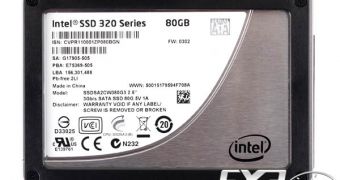With just a few days left until Intel's third generation of solid state disks are officially launched, the last bits and pieces of information about these SSD made their way to the Web to detail just what kind of read and write transfer rates we can expect from these storage solutions.
The third generation of Intel SSDs, also known as Postville Refresh, will continue the legacy of the X25-M G2 drives, come in the 2.5-inch form factor, use the SATA 3Gbps interface and feature 25nm NAND memory from Intel-Micron Flash Technologies (IMFT).
The new range will include no less than six models and will range in capacity from 40GB to 600GB.
As its the case with most other SSD solution, their sequential write speed varies according to the number of memory channels used and the bigger drives are usually the ones yo get if performance is of utmost importance.
Starting from the bottom and making our way up, the first 320-series drive we encounter has 40GB of storage capacity and its sequential read speed is listed at 200MB/s while the sequential write speed is estimated at 45 MB/s.
Moving to the 80GB SSD will double this speed (to 90 MB/s) and will also up the sequential read speed to 270MB/s.
This latter value is standard for all the drives that we encounter from now on, so only the write speed will go up together with capacity from this point on.
This means that the 120GB drive is able to reach write speeds up to 130 MB/s while the 160GB and 300GB units top in at 165 MB/s and 205 MB/s, respectively. Sadly, details about the performances of the 600GB drives aren't available right now.
Judging by these values, Intel's third generation SSDs won't provide a huge speed increase over the company's current mid-range SSDs, but some improvements are available none the less.
In addition, prices of the higher capacity drives have also come down quite substantially so these could prove to be a nice alternative for users who need more storage space.
To get an idea about how these drives perform in real life, Expreview has posted a preview of the Intel 320-series 80GB SSD. (via Sweclockers)

 14 DAY TRIAL //
14 DAY TRIAL //